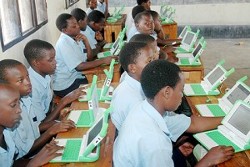The Jubilee Coalition pledged free solar powered laptops to children joining Class One in 2014 during their campaign rallies. They treated it as their pet project and promised to roll it out once they got into power.
Going by Jubilee's elaborate and digitally-propelled campaigns, even it's avowed critics cannot deny it's capacity to deliver on this ambitious project and hence the analogy of 'the digital versus analogue duel' catchphrase that marked its campaigns.
The proponents of this project continue to say that it is a noble idea targeting to birth a new tech-savvy generation that will be compliant with the dictates of this era.
Buoyed by the success of Narc's Free Education Program that took off in 2003, these proponents are convinced beyond a shadow of a doubt that it will become a reality.
They further remind the naysayers that the Millennium Development Goals and Kenya's Vision 2030 are anchored on technology and science. Rwanda with a Gross Domestic Product of 644 billion shillings against Kenya, the East Africa's leading economy with a GDP of Kshs 3.1 trillion has managed a laptop revolution titled One Laptop per Child (OLPC).
It's geared into moving Rwanda from the humanitarian assistance phase associated with the 1994 genocide into one of sustainable development. It appears there's no stopping for this ambitious project by the Jubilee Government if Rwanda can afford it.
But why the divergence in views among Kenyans? Where some praise it as a noble cause, others oppose it as untenable. A sure guess is in its implementation. It's an implementation that sounds like the what-came-first-between-the- egg-and -chicken complex.
The opponents of this project say that the cost implications are prohibitive. The Kshs 150 billion annually for solar powered laptops to the 800,000 children joining Class One yearly at the expense of emergencies like ensuring food security, upgrading the infrastructure that has received a bashing from the floods, effecting devolution and handling issues affecting women and youth. These demands are a nightmare to Kenya's fledgling economy.
In an era where gambling with reality is tantamount to committing suicide, the critics of this project say that it should not be implemented until measures are put into place to develop this human resource(read teachers) on computer literacy.
Sidebar
Magazine menu

 Teline V
Best News Template For Joomla
Teline V
Best News Template For Joomla
18
Thu, Apr
0
New Articles










